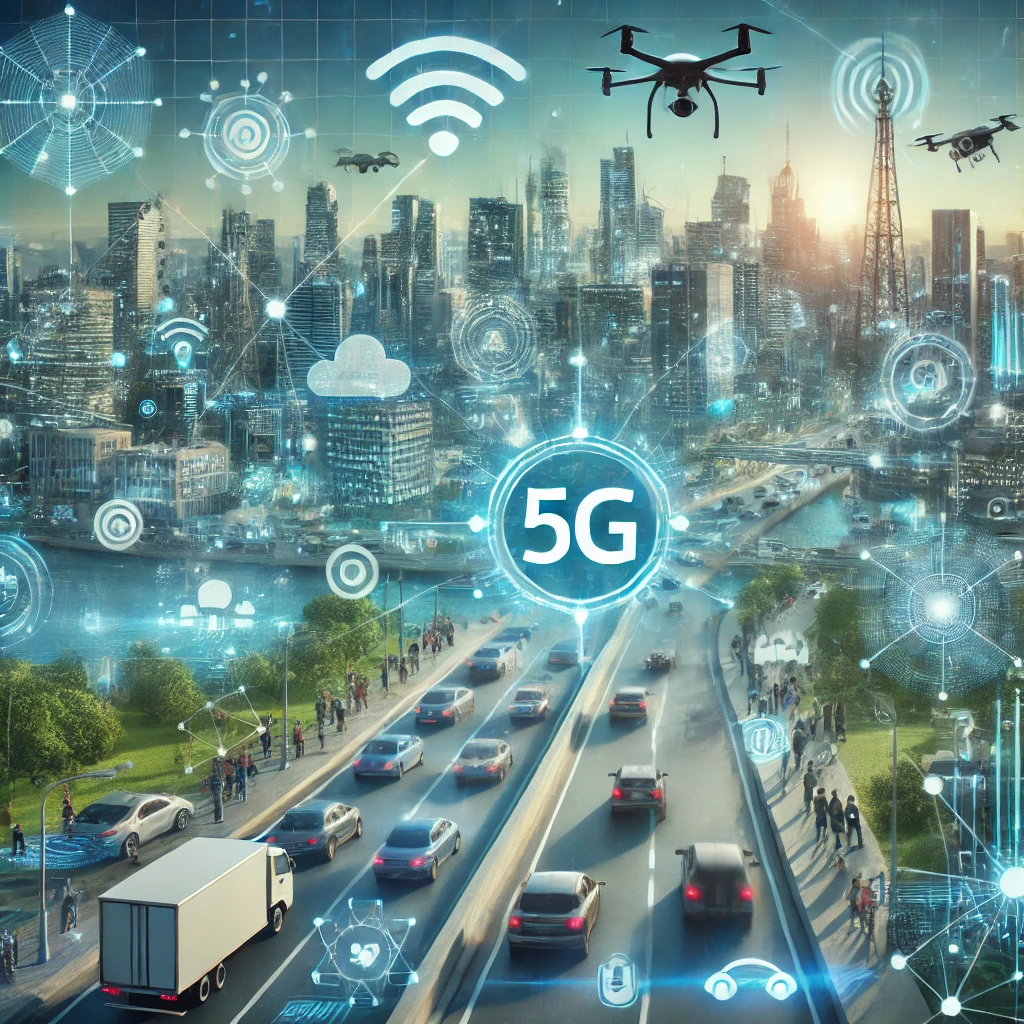5G technology, the fifth generation of wireless communication, is set to revolutionize the way we connect and interact with the world around us. With promises of unprecedented speed, low latency, and massive connectivity, 5G is poised to transform various industries and enhance our daily lives. This article explores the future of 5G technology, highlighting the advancements, applications, and transformative impact we can expect.
The Evolution of 5G Technology
Understanding 5G
5G, or fifth-generation wireless technology, is designed to provide faster speeds, lower latency, and greater capacity than its predecessors. It operates on higher frequency bands and utilizes advanced technologies such as massive MIMO (Multiple Input Multiple Output) and beamforming to deliver enhanced performance.
Key Features of 5G
- Ultra-Fast Speeds: 5G offers download speeds up to 100 times faster than 4G, enabling rapid data transfer and seamless streaming.
- Low Latency: Reduced latency, often as low as 1 millisecond, allows for real-time communication and instantaneous response.
- Massive Connectivity: 5G can support a vast number of connected devices, facilitating the growth of the Internet of Things (IoT).
Advancements in 5G Technology
Enhanced Mobile Broadband (eMBB)
Enhanced Mobile Broadband will deliver faster and more reliable mobile internet connections. This will improve user experiences for applications such as streaming high-definition videos, online gaming, and virtual reality (VR).
Ultra-Reliable Low Latency Communications (URLLC)
URLLC is crucial for applications requiring near-instantaneous data transmission, such as autonomous vehicles, remote surgery, and industrial automation. This advancement ensures high reliability and minimal delay, enabling critical real-time applications.
Massive Machine Type Communications (mMTC)
mMTC will enable the connection of billions of IoT devices, ranging from smart home appliances to industrial sensors. This will support the development of smart cities, agriculture, healthcare, and more, fostering an interconnected and intelligent ecosystem.
Applications of 5G Technology
Smart Cities
5G will be the backbone of smart cities, enabling real-time monitoring and management of urban infrastructure. Applications include intelligent traffic systems, energy-efficient buildings, and enhanced public safety through connected surveillance systems.
Healthcare
In healthcare, 5G will facilitate telemedicine, remote patient monitoring, and real-time data sharing. This will improve access to medical services, enable precise and timely diagnostics, and enhance patient care.
Autonomous Vehicles
5G’s low latency and high reliability are essential for the safe operation of autonomous vehicles. It will support vehicle-to-everything (V2X) communication, allowing vehicles to interact with each other and their surroundings, reducing accidents and improving traffic flow.
Industrial Automation
Manufacturing and industrial sectors will benefit from 5G through enhanced automation, real-time monitoring, and predictive maintenance. This will increase efficiency, reduce downtime, and optimize production processes.
Entertainment and Media
The entertainment industry will see a significant impact from 5G, with advancements in augmented reality (AR), virtual reality (VR), and immersive gaming experiences. High-speed connectivity will enable seamless streaming and interactive content delivery.
Challenges and Considerations
Infrastructure Development
The deployment of 5G requires substantial infrastructure upgrades, including the installation of small cells, antennas, and fiber optic networks. This poses logistical and financial challenges, particularly in rural and underserved areas.
Spectrum Allocation
Efficient spectrum allocation is critical for the success of 5G. Governments and regulatory bodies must ensure that sufficient spectrum is available and properly managed to support the growing demand for wireless communication.
Security and Privacy
With increased connectivity comes greater vulnerability to cyber threats. Ensuring robust security measures and protecting user privacy will be paramount as 5G networks expand.
Interoperability
Achieving interoperability between different 5G networks and devices is essential for seamless connectivity. Standardization and collaboration among industry players are necessary to ensure compatibility and reliability.
The Future Impact of 5G Technology
Economic Growth
5G is expected to drive significant economic growth by enabling new business models, services, and industries. The increased efficiency and productivity across various sectors will contribute to global economic development.
Innovation and Research
The enhanced capabilities of 5G will spur innovation and research in fields such as artificial intelligence, robotics, and biotechnology. This will lead to groundbreaking discoveries and advancements that were previously unattainable.
Improved Quality of Life
By facilitating smart solutions and connected services, 5G has the potential to improve the quality of life for individuals and communities. From enhanced healthcare to smarter transportation systems, the benefits of 5G will be far-reaching.
FAQs about 5G Technology
What is 5G technology?
5G, or fifth-generation wireless technology, is designed to provide faster speeds, lower latency, and greater capacity than previous generations of wireless technology. It supports ultra-fast data transfer, real-time communication, and massive connectivity.
How does 5G work?
5G operates on higher frequency bands and utilizes advanced technologies such as massive MIMO and beamforming. These technologies enhance performance by increasing data transfer rates, reducing latency, and supporting a larger number of connected devices.
What are the benefits of 5G?
Benefits of 5G include ultra-fast speeds, low latency, and massive connectivity. These features enable applications such as smart cities, autonomous vehicles, telemedicine, and enhanced entertainment experiences.
What are the challenges of deploying 5G?
Challenges include infrastructure development, spectrum allocation, security and privacy concerns, and achieving interoperability between different networks and devices.
How will 5G impact various industries?
5G will transform industries such as healthcare, transportation, manufacturing, and entertainment by enabling new applications, improving efficiency, and fostering innovation.
What is the future of 5G technology?
The future of 5G technology includes continued advancements in speed, connectivity, and applications. It will drive economic growth, spur innovation, and improve quality of life through smart solutions and connected services.
Conclusion
The future of 5G technology holds immense potential to transform our world. As we embrace the advancements and applications of 5G, we can expect significant improvements in various aspects of our lives. From smart cities to autonomous vehicles, healthcare to entertainment, 5G will pave the way for a more connected, efficient, and innovative future.
Sources
- 5G Technology Overview – Qualcomm
- Advancements in 5G – Ericsson
- Applications of 5G – GSMA
- Challenges of 5G Deployment – IEEE Spectrum
- Future Impact of 5G – McKinsey & Company
Exploring the future of 5G technology reveals a world of possibilities and advancements that will enhance connectivity and transform industries. Stay informed and prepared for the exciting changes that 5G will bring.


